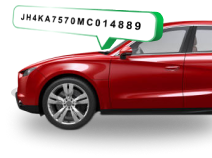Vermont VIN Check


How to Perform a VIN Lookup in Vermont?
If you want to perform a VIN lookup in Vermont, you have an offline option and an online option available. Motor Vehicle records in Vermont are maintained by the state's Department of Motor Vehicles. Hence, you can look up vehicle records by making a request to the Vermont DMV. However, the Vermont DMV only releases motor vehicle records to authorized persons under the federal Driver's Privacy and Protection Act. Also, to look up motor vehicle records with the DMV, you will need to provide more information than the vehicle identification number (VIN).
A reliable online VIN lookup service like GoodCar only requires the VIN number to perform a VIN check. Once you have the VIN number, submit it by filling it in the search bar on GoodCar's VIN search resource on the homepage of their website. Next, select the search button to query GoodCar's database to obtain a vehicle history report.
Why Should I Run a vt VIN Check?

VIN lookups serve various purposes. Insurance companies use them to check a car’s history for policy coverage calculations, while law enforcement may verify if a vehicle is stolen during inspections. Prospective vehicle buyers also run VIN to obtain the following information:
A vehicle is described as a lemon if it has defects that have become irreparable. Vermont’s Lemon Law was promulgated to protect persons who purchase or lease passenger motor vehicles registered in the state that are still under the warranty of the manufacturer with a nonconformity. A nonconformity is a condition or defect covered by the vehicle's warranty that substantially affects the use, market value, or safety of the vehicle.
The state's lemon law compels vehicle manufacturers to repurchase or replace a vehicle if, after a reasonable number of attempts, the nonconformity cannot be corrected. A repair attempt three times without success suffices as a reasonable number of repair attempts. After the definition of a reasonable number of repair attempts has been met, the vehicle owner may notify the manufacturer of the nonconformity in writing and request for replacement or repurchase.
A VIN check will indicate if a vehicle has been previously labeled a lemon. Hence, a VIN check will save you from buying a vehicle that has a serious defect that may be unrepairable. If the vehicle has been repurchased by the manufacturer, you will also see the notification in a VIN check result.
Why Choose GoodCar for Vermont VIN Lookup?
Requesters can benefit from extensive vehicle records and reports as they obtain information from accredited data providers like the NMVTIS. GoodCar also illustrates theft checks, collision records, recalls, flood, hail, or fire damage, and pricing.
Vermont Resources
-
Who Issues A Vehicle's VIN In Vermont?
Vehicle manufacturers issue VIN numbers, not Vermont authorities. However, if you have a vehicle with a destroyed VIN or a homemade vehicle, you may apply to the Vermont DMV for an assigned VIN.
-
How do I verify a VIN in Vermont?
You can verify a Vermont VIN using GoodCar’s online VIN check service. Once you have the VIN ready, enter it in GoodCar’s VIN check search bar and select search. The next page will reveal whether the VIN number matches the vehicle from which it was taken.
-
Is it safe to check a Vermont VIN online?
There are no legal consequences for checking a VIN online. Also, no personal information (of the requester and the owner of the vehicle with the VIN) is required or revealed in a VIN check.
-
Do I need a VIN inspection in Vermont?
VIN verification is required in Vermont for the following:
- Vehicles with salvage documentation from any state, including Vermont
- Vehicles that are being titled under bond
- Vehicles older than 15 years, for which a Vermont resident wants an "Exempt Title"
- Vehicles with registrations from a foreign country
VIN verifications are completed by a Vermont law enforcement officer, an agent employed by a law enforcement unit employed for VIN verification purposes, and under the direct supervision of a law enforcement officer or a DMV employee designated by the state Commissioner of Motor Vehicles.
-
Are Vermont VIN checks necessary for out-of-state vehicles brought into Vermont?
Yes, VIN verifications are required for vehicles with registrations from any foreign country, including Canada.
-
What does a Vermont VIN check reveal?
A Vermont VIN check reveals information about a vehicle's standard specifications, colors, title status, collision records, OEM options, location history, manufacturer information, mileage, accident history, lien records, and much more.
-
Can you ask for the VIN from a Vermont seller?
You can ask for a vehicle’s VIN number from a Vermont vehicle seller. It is standard practice for potential vehicle buyers to ask for VIN numbers from dealers or private vehicle sellers.







